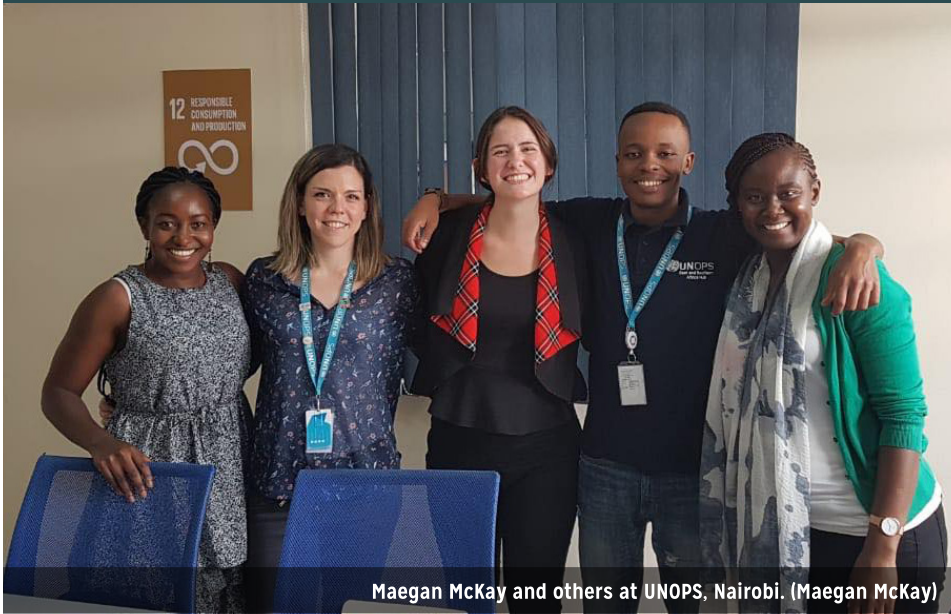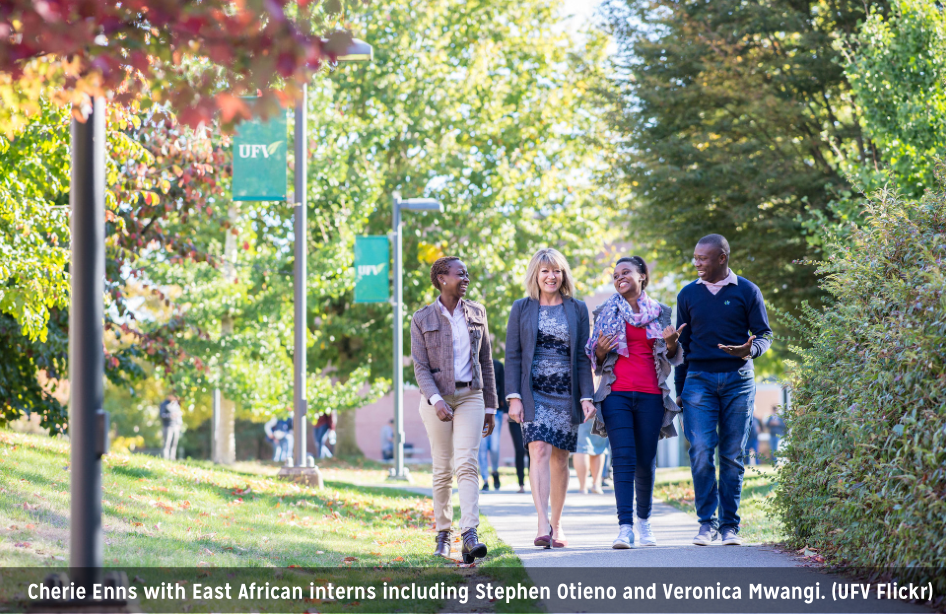Imagine this: you’ve been chosen by the United Nations to be an intern. Now, not only have you been chosen to work for a major multinational organization, but they want you to go to Nairobi, Kenya to work. That’s right, Africa. Now imagine getting there. You’re in a foreign country, working for an important international organization. You’re working on a project proposal while gazing out onto the shore of an East African beach. The sand is white, the ocean smells salty, and warm wind blows in through the open window as you work on something that could possibly change lives.
UFV is one of 20 Canadian universities who received the Queen Elizabeth Scholars (QES or QEScholar) funding. This funding is used to facilitate an international internship exchange program where students live and work abroad for three months.
The first round of funding was awarded to UFV in 2014 — enough for 28 domestic or international UFV students and eight East African students to participate in international internships with institutions such as the United Nations, universities, think tanks, NGOs, and non-profit societies from all over the globe.
According to the QES website, the purpose of this program is to promote international student exchange and civic engagement.
“The QES program is helping to grow young Canadians into global citizens while promoting Canada as a destination for the world’s top talent and attracting top talent and international research leaders to Canada,” the website states.
UFV recently received a second round of funding to send more students abroad. While the last round of funding focused on food systems and food security and provided funding for internships in Canada, Kenya, or Tanzania, the second round of funding has shifted focus. This time, QEScholars will be working on urban policy and urban planning and four countries will be included: Kenya, Tanzania, India, and Canada.
Many students graduate from university with incredible potential, but little to no job or international experience. The QES program is helping to change that by providing students a unique opportunity to gain not only work experience, but life experience, as they adapt and grow in an unfamiliar environment.
I sat down with the QES coordinator for UFV, Cherie Enns, on a sunny spring day at UFV’s Abbotsford campus. Enns is a UFV faculty member who is part of the geography and global development studies programs at UFV. She’s helped many students over the years participate in international internships. I asked her about the purpose of the QES program.
“This idea of cross-cultural understanding and awareness is my personal interest in it. I think a lot of the way we see the world is so influenced by the voice of academics, but when you’re actually there and you’re paying for drivers and you’re renting apartments, you’re part of an economy. So you’re just going and experiencing and living in another place,” said Enns.
This is the way education should be, Enns explains. Hands-on learning within the context of an environment can have an impact on students that can change their lives and the way they view the world.
“Three months to do and live differently — what a gift,” said Enns.
A recently returned intern, Maegan McKay, said that she is grateful for the personal growth she experienced throughout her involvement with QES. While many Queen Elizabeth Scholars travel in a group to their destination country and remain working together when there, McKay went on her own to Nairobi, Kenya.

“That feeling of being on my own was so empowering and I like being by myself now. I never used to like being by myself, but I love being alone now,” said McKay. “So there’s that feeling in life, whenever calamity hits or something terrible strikes, I’m like, ‘I lived in Nairobi, by myself. I can get through this.’”
McKay worked for the United Nations Office for Project Services (UNOPS), a division of the UN that focuses on conflict and providing peace, and humanitarian and development projects in membership countries. While she was there, McKay worked on proposal writing, among other things, for high level projects being implemented in East Africa. She attended meetings with the World Bank, the International Financial Institution, European governments, and lived with a Somali woman who was working for the Finnish embassy.
McKay’s favourite memory is a culmination of all the friendships she made with both domestic and international QEScholars.
“The thing that really benefited me about being a QEScholar was the fact that, even though I felt like I didn’t know anybody, there was a network of Queen Elizabeth Scholars in Kenya, who were Kenyan and helped me so much,” McKay said.
The passionate connections, friendship, and community of scholars is what stands out for many students upon reflecting on their internships. The QES program weaves scholars together into a global community bonded by a thread of shared experiences and common love for both their host and home countries.
“My last two weeks in Canada, I went on so many coffee dates, had so many beautiful conversations; all these different students, people who truly cared and were so excited for me,” gushed McKay. “Their heart was so in love with Kenya and so in love with East Africa — they talked about it with such high esteem. And then, when I arrived, and connecting with the other scholars who were there in Kenya. Just the most amazing conversations about their experience in Canada.”
Madison Stewart is a UFV alumni soon to start her master’s program at the University of Cape Town in South Africa. She spoke to me via email about her experiences with QES. In 2014, she travelled to Dar es Salaam, Tanzania with five other UFV students to research agricultural markets and urbanization with Ardhi University. Stewart said that travelling and working with a diversity of interns benefited her overall learning experience.
“We all came from differing backgrounds (i.e. economics, social work, political science, and development studies),” Stewart said. “This diversity helped us to share ideas, resulting in a more holistic understanding of the changes happening in the East Africa region.”
QES is a global network of friends and scholars who are changing the face and practice of development, food systems, urban space, and learning. At the same time, it is connecting students to global leaders and institutions and preparing them for a future in whatever field they choose.
“QES has connected me with global think tanks, policy makers, and educators abroad which have helped me plan for my future,” Stewart said.
Students have experienced some fantastic successes and achievements through QES. Some have even been invited back with funding by the institutions they worked for. One group of students had their research paper published in the Undercurrent Journal and another group met with the governor general at Rideau Hall in Ottawa to discuss their experiences. Moreover, students are working on some fascinating projects that are spiking their interest in international communities.
“My favourite memory with QES was during our surveys in rural open-air markets in Kisongo,” Stewart said. “This market, and the survey answers from this region, provided an illustration of how the pastoralist Maasai people participate in Tanzania’s food system. Their complex pastoralist livelihoods and adaptation to growth in Tanzania especially interested me.”
The QES funding is not only for internships, but also for events where scholars can share their work, experiences, and network with the broader community. Past events have included photo exhibits and panel discussions on food security and urban planning.
In 2017, the Future of Food event included a panel with East African QEScholars who had come to UFV. One scholar at this event, Stephen Otieno, wrote an insightful blog post observing the changing nature of Abbotsford.
“It is my third time in Abbotsford in just about three years, and I have noted the rapid transformation taking place in the city’s landscape,” Otieno said in the blog post. “Abbotsford is caught in this social-economic and political quagmire. A struggle to maintain its grip on the invaluable agricultural land, and the pressure to absorb the shocks from imminent urban-rural migration.”
Not only are Canadian UFV students experiencing the changing cities of East Africa, so too are East Africans observing the culture and changing face of Canadian cities.
Veronica Mwangi from Nairobi recounts her experience of fall and Thanksgiving in Canada. In a blog post that QEScholars are required to fill out, she makes note of her experience adjusting to the climate in Canada.

“Another first for me was the experience of fall weather; days of erratic weather patterns,” Mwangi wrote. “My body couldn’t fathom how a place could be sunny, then suddenly turn into showers of rain accompanied by chilly weather, then sunny again. All in a day!”
Mwangi discusses her experience of her first Thanksgiving dinner in Canada and, ever a scholar, wonders about the amount of food waste Canadians may produce on this holiday.
Another intriguing and enthusiastic post from Guido Uhinga, an intern from Dar es Salaam staying in Baker House at the Abbotsford UFV campus, mentions surprising cultural differences between their host and home communities. Some things they note are the preference of people in Abbotsford to drive rather than walk, the absence of shoe shiners and shoe makers who are popular in Dar, the prohibition of public drinking, the challenge of determining what greeting style to use in such a multicultural city, and the difficulty of adjusting to strict time schedules.
“Recently, we had to learn our lesson in hard way when we were called to attend a meeting to discuss residence matters at Baker House,” Uhinga wrote. “The chair-person denied us access into the meeting room because we got there three minutes late. We could not believe that was really happening! However, we took it positively and accepted the angry truth.”
In this way, both Canadian and East African students benefit from the QES program.
“Honestly, if we didn’t have that element of reciprocity, and even still it’s marginal, it wouldn’t feel very good to me. I’m working really hard, to make it clear, that we go there as guests to learn. And likewise, when students come here, as guests to learn. So it’s more, trying to move away from that saviour mentality idea,” Enns said.
Travelling and adventure is all the rage these days, but there is a big and important difference between travelling and actually living and immersing yourself in the culture of a place. If the thought of this excites you, reach out to Cherie Enns or Maegan McKay and they’ll be more than happy to sit down and discuss your options.
“There’s so many things you can say to yourself to be like, I’m not good enough for this. Like, stop! Stop saying those things to yourself,” McKay said . “Think to yourself: what do you want to do? Do you dream about this at night, can you not stop thinking about it? There are funds available for you, there are people who will help you, there’s a network — people want you to do this.”
What better way to grow and learn than to push yourself outside of your comfort zone? Absorb a new environment and culture, and then return the favour of its beauty and knowledge in the form of service. International experience can benefit the individual student in many ways. It can result in personal growth, international connections, insight, and confidence, but these benefits inevitably bleed into the community and extend to the broader good of humanity.
Header image: Renee Campbell/The Cascade

Darien Johnsen is a UFV alumni who obtained her Bachelor of Arts degree with double extended minors in Global Development Studies and Sociology in 2020. She started writing for The Cascade in 2018, taking on the role of features editor shortly after. She’s passionate about justice, sustainable development, and education.


